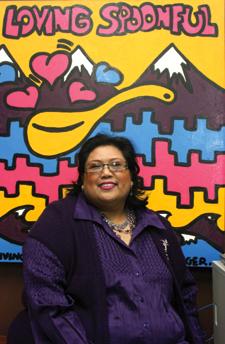Twenty years ago, Easter Armas saw an acquaintance eating out of a dumpster. The once-successful architect had lost his job after he was diagnosed with HIV.
“I just cried all the way home,” Armas recalls. “I was wondering, ‘Where are his friends? Is anyone worried that he is not home, that he is not eating?’”
In 1989, she decided to start a meal program, later named A Loving Spoonful, to provide free food for people living with HIV/AIDS.
Two decades and 1.75 million free meals later, A Loving Spoonful has grown from five clients to more than 300.
“What we do is very tangible,” Armas says. “People can understand meals, but it is also everything that goes with it. It’s the sense of community.”
While providing meals might not be one of the first services that come to mind for people with HIV/AIDS, their importance can’t be underestimated, she says, noting that people with AIDS are often too sick or depressed to feed themselves.
A Loving Spoonful’s executive director, Lisa Martella, says 80 percent of AIDS deaths are caused by malnutrition rather than the disease itself.
“Nutrition is also an important part of the medication being able to work.”
Dave (who requested that his last name not be used) was diagnosed with HIV in 1990 and had his first meal from A Loving Spoonful delivered to his home three years ago. Within eight months he packed on 35 pounds, weight he had previously lost due to HIV-related side effects.
“It very much saved my life,” says Dave. “People drop out of your life when you get sick but Loving Spoonful didn’t. They were there once a week or more. They fed me socially, but more importantly they fed me with great food.”
“It went from a scary disease 10 years before to a disease that everybody cared about. The gay community was so well aware of the losses of my age group.”
Armas also began observing changes in the face of AIDS. In the beginning, she says, she catered almost exclusively to the “a typical, white gay male.” Today, A Loving Spoonful is serving clients from all demographic groups.
For Armas, A Loving Spoonful is a success story but one with a bittersweet feeling to it. She expected the organization would be around for only five years, believing that a cure for HIV/AIDS would be found by then.
“I am remembering all those who are not here but helped build the society, and I am thinking, ‘Okay, I am 15 years past due to close this society. What do we do now, Easter?’
“So it is a happy event but also painful. It’s a painful reminder.”

 Why you can trust Xtra
Why you can trust Xtra


